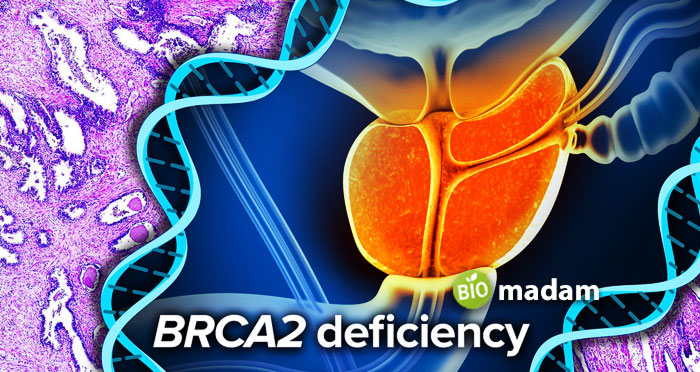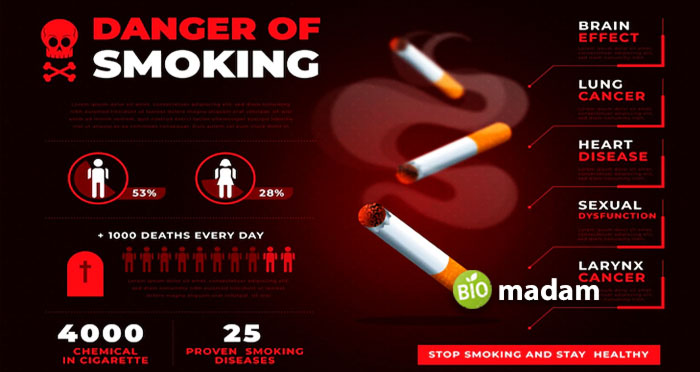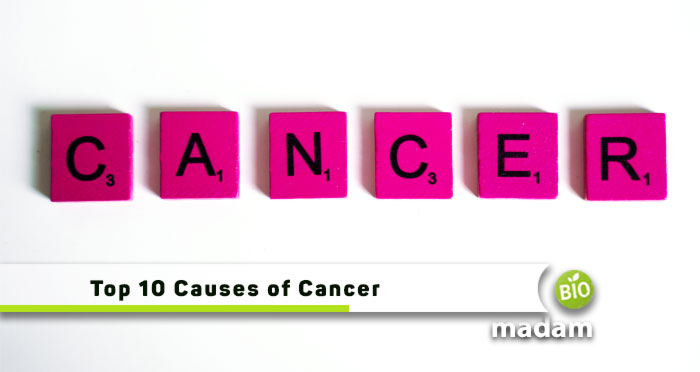Cancer is one of the most prevalent diseases in the world, leading to 10 million deaths globally every year. Research showed an estimated 1.9 million new cancer cases in 2022.
While cancer typically exhibits signs and symptoms after it has affected a part of your body, you can save yourself from cancer by considering the risk factors. They might not surely prevent cancer, but they can help reduce the chances of developing the disease.
Let’s tell you more about the condition, including the top 10 causes of cancer.
What is Cancer?
Cancer refers to the abnormal growth of cells in the human body. All living organisms grow through mitosis and meiosis. Meiosis is involved in reproduction, while mitosis helps in growth and development through cytokinesis and karyokinesis. The normal growth of cells and tissues allows living organisms to become adults from a tiny egg.
However, when the cells begin multiplying abnormally, they lead to cancer. Cancers can be malignant or benign. Benign tumors or cancers stay in one location, whereas malignant tumors show metastasis and move to other body parts. Many cancer patients lose their lives as the treatment is complicated and tiring. It is difficult to target the cancerous cells without damaging nearby healthy cells.
Thus, keeping yourself safe from the chances of developing the disease is better. Here are the most common causes of cancer you can avoid:
Common Causes of Cancer
Obesity
Many people do not realize that obesity is the root cause of many deadly diseases and conditions, including hypertension, diabetes, and cancer. Often people also confuse obesity with being slightly overweight. Calculating your BMI can be the initial step to see if you are in the normal range or obese.
Obese people are at a higher risk of developing kidney, colon, rectum, gallbladder, pancreas, and esophagus cancers. Women with a higher weight are more likely to develop endometrium and breast cancers.
How to Avoid Obesity
Maintaining a healthy diet and adequate physical activity is the first step to preventing obesity. Calculate your fats, proteins, and carbohydrates to ensure you do not intake high amounts. Nutritionists suggest cutting down on high-carb and high-fat foods to maintain good health. These healthy habits may also help manage comorbidities like high blood pressure and cardiovascular diseases.
Age
It is widely known that the chances of diseases increase with age. Although there are many types of immunity, but older people’s immunity is not as strong as the young, so they cannot fight the triggers. Studies show that the risk of cancer grows gradually in different age groups. Most people are diagnosed at the age of 66 as the symptoms aggravate. The type of cancer may also influence the age for cancer diagnosis.
| Age Group | Cancer Cases per 100,000 people |
| Below 20 | < 25 |
| 45 – 49 | 350 |
| > 60 | 1,000 |
How to Avoid Cancer in Old Age
While you cannot fight the natural phenomenon of aging, you can avoid the chances of cancer by keeping healthy. Add more antioxidants and anti-inflammatory foods to your diet. Incorporating immunity-boosters help your body fight better against cancer-causing factors when the immune system weakens with age.
Genetics
Most cancers are not directly linked to genetics, yet sometimes mutations in genes and alleles may lead to cancer symptoms. The mutation may be present in a single cell that might be transferred to the off-springs. Breast, prostate, and colon cancers are the most common cancers in families. Sometimes, ovarian and pancreatic cancers may also be genetic.
For example, the BRCA1 and BRCA2 genes save you from cancer development, and a mutation in these genes may affect their activity. So, if you inherit these genes from your parents, you might be more susceptible to cancers like breast and ovarian cancer.
How to Avoid Genetic Cancers
The best way to prevent cancer development when you inherit a mutated gene is to get screening done to find them in time. Focus on staying healthy and taking immunity-boosting foods like dragon fruit to keep cancer growth away.

Chronic Inflammation
Inflammation refers to the swelling of a body part due to an injury or infection. It may be a bacterial or viral infection caused by the entry of antigens and pathogens into the body. Mostly these infections are treated with antibiotics that might cause constipation. However, they might persist sometime. Eventually, white blood cells, such as B and T cells, accumulate at the site of infection to fight the type of antigen and heal the tissue. The release of chemicals from the damaged part signals the inflammatory response.
Sometimes, the inflammatory process may start without any injury or external pathogen. When the inflammation does not go away, it can turn into chronic inflammation, which damages the DNA, leading to cancer. Obesity and adverse immune reactions are among the major causes of chronic inflammation in the body.
How to Avoid Chronic Inflammation
If you experience chronic inflammation, eliminate foods that may contribute to worsening inflammation. Doctors also suggest intaking anti-inflammatory foods to prevent further damage. Weight control and workout may also help control inflammation before it spreads.
Radiation
You might have heard about radiation therapy for the treatment of cancer. But do you know that excessive radiation can also contribute to cancer in different parts of your body?
Gamma rays and x-rays can pass through your tissues and organs and ionize the molecules. The ionization of DNA molecules leads to unwanted changes that increase the chances of cancer development in people who work near radiation. Low-energy radiation, such as cell phone radiation, has been seen to produce cancer. At the same time, high-energy radiation like alpha, beta, and gamma rays may damage DNA composition, and the human genes as well.
PET scans, CT scans, X-rays have a slightly detrimental effect on your health. But, they do not contribute to cancer development. People who work in areas where radiation is regularly used are at a higher risk of being affected.
How to Avoid Radiation
Professionals working in high-radiation areas are suggested to wear adequate equipment to save direct interaction with the radiation. It can decrease the intensity of the radiation entering your body and prevent cancer.
Infections
Sometimes, unidentified, prolonged infections may also cause cancer and go unnoticed. Sometimes bacteria and viruses may interfere with the signaling pathway and affect the immune system. A lowered immunity means a higher chance of the causative agent inducing the production of cysts or tumors in the body. Many infections spread through contact from one person to another. Eventually, it increases cancer risk in not only one person but many.
How to Avoid Infections
Infections can be avoided by preventing the entry of infection and disease-causing agents like parasites, protozoa, and bacteria. It is better to sanitize your hands before eating and touching your nose or eyes. Also, wear a mask when you go out. It saves you from possible pathogens, passive smoke, and environmental factors.
Alcohol
Alcohol has become such a part of our routine that we do not realize how harmful it can be to our health. Excessive intake of alcohol can lead to fatty liver disease, which may contribute to the prognosis of the condition into cancer. Moreover, it damages the mouth, throat, esophagus as it passes through the gastrointestinal tract. Alcohol may also increase the risk of developing breast and larynx cancer. If you smoke tobacco and drink alcohol regularly, you must rethink it!
How to Avoid Alcohol Consumption
Avoiding alcohol consumption is all about self-control. The federal government’s Dietary Guidelines for Americans suggest one glass of alcohol per day for women and two glasses for men. If you think you are drinking more than this, avoiding gatherings where abundant drinking is a norm is better.
Tobacco
When doctors tell you to stop smoking to avoid cancer, they are basically telling you to stay away from tobacco.
Studies have shown tobacco to be one of the major contributing factors to cancer worldwide. It does not only harm the smoker but also people who inhale the smoke through passive smoking. Some tobacco components cause mutations in the DNA, increasing the chances of cancer in people who smoke.
Tobacco smoking is the most fundamental cause of lung diseases like asthma, COPD, and lung cancer. It may also cause cancer of the esophagus, trachea, throat, mouth, kidney, bladder, liver, stomach, cervix, pancreas, colon, and rectum.
Many smokers think that the tobacco product they consume is better than others. There is no evidence showing safety in tobacco intake.
How to Avoid Tobacco Intake
The best choice is to stop smoking, as it leads to many problems by damaging the body’s anatomy and physiology. It might seem difficult initially, but you can use nicotine patches or gum to taper off the effect. Individuals who stop smoking at the right time have a much higher life expectancy than smokers. It also saves their family from inhaling passive smoke.

Chemicals
Some chemicals have also been seen to have an association with cancer cell development in healthy tissues. They are known as carcinogens and may be present around us.
Carcinogens can be lethal if you do not protect yourself. A particular chemical is typically only related to a specific type of cancer. The chemicals listed as carcinogenic might not always be cancerous in all circumstances. For example, UV rays may cause cancer cell development in people with low melanin. But they are not cancerous in all conditions. A few carcinogenic chemicals that may cause cancer include acrylamide, agent orange, antiperspirants, asbestos, benzene, cosmetics, diesel exhaust, firefighting, formaldehyde, hair dyes, etc. These are only a few carcinogenic chemicals. The list is extensive, and some might not have been discovered yet.
How to Avoid Carcinogenic Chemicals
By wearing gloves and restricting interaction with these chemicals, you can avoid cancer through carcinogenic chemicals. Handle them with care and avoid using them in high quantities.
Immunosuppressants
As the name suggests, immunosuppressant medicines suppress or decrease the activity of your immune system. They are widely used in auto-immune diseases and organ transplants. People who undergo an organ transplant, like a kidney, heart, or liver, to improve their functioning, are given immunosuppressants to increase acceptance. Thus, it prevents the body from damaging the donor organ. Eventually, the suppressed immunity may also fail to identify cancer cells. The risk of cancer is higher in transplant recipients as infectious pathogens may cause cancer.
How to Avoid Cancer when using Immunosuppressants
Some doctors prescribe Rapamycin to transplant patients to reduce the chances of cancer. You may also connect to your physician to avoid DNA mutations through adequate regimens.
The Bottom Line
Cancer is a prevailing disease with millions of cases globally. Understanding the causes and risk factors of cancer in the body can help avoid it. Some major causes of cancer include chronic inflammation, infections, obesity, and environmental factors. Patients taking immunosuppressant drugs are at a higher chance of developing cancer. Sometimes, people may carry a mutated gene from their parents, contributing to cancers like breast and ovarian cancer. MRI and CT Scan can be helpful in finding cancer early to save you from complications.
FAQs
What are five things that cause cancer?
Among the many cancer-causing factors, tobacco and chronic inflammation are the most common. Smoking, chemicals, infections, and genes may also contribute to cancer growth.
What are cancer genes?
Cancer genes are specific genes in the body that cause cancer. More than 80% of cancers arise from genetic mutations, some of which are inherited. Oncogenes, tumor suppressor genes, and mismatch-repair genes are the three main types of cancer genes.
What do gene mutations do?
Gene mutations may lead to the rapid growth of the cell, initiating and facilitating the spread of cancer within the body. Sometimes, these gene mutations fail to stop uncontrolled cell growth. Mutations in the tumor suppressor genes are a major contributor to cancer development.

Anna has completed her degree in Pharmacy from the University of Hawaii. She is serving as a research assistant in a pharmaceutical company. She had a great interest in writing blogs, traveling to different parts of the US, and trying delicious recipes in her spare time.

